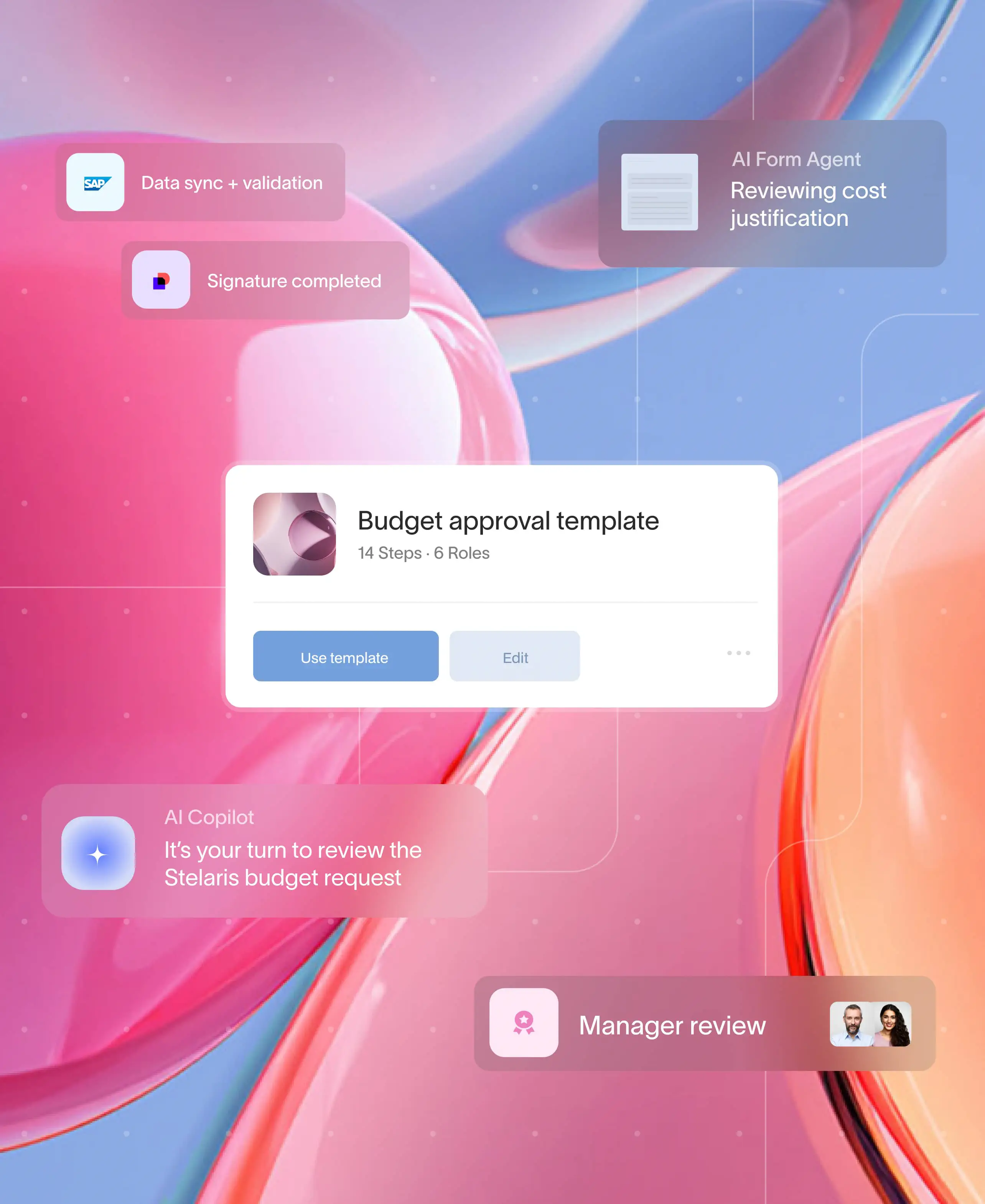.webp)
At a glance
Intelligent workflow automation: Invoice processing automation replaces manual handling with intelligent, end-to-end workflows across PO and non-PO invoices.
Automated data capture & matching: Automated data capture and 2- or 3-way matching ensure faster approvals, higher accuracy, and fewer payment errors.
Visibility & control for finance: Finance teams gain visibility and control through centralized dashboards, audit trails, and role-based approvals.
Streamlined external workflows: Moxo streamlines this critical external workflow, enabling scalable AP automation that integrates with ERPs and streamlines vendor collaboration.
Why invoice processing is still broken
Despite ongoing digitization, accounts payable remains one of the most manual functions in finance. Invoices often arrive through email or paper, creating data inconsistencies and approval delays. According to Ardent Partners’ “AP Metrics That Matter in 2025” report, over 48% of AP leaders and teams are prioritizing implementing AP automation in 2025, to drive efficiencies and overcome challenges such as slow processing times, lack of visibility, excessive invoice exceptions, and more.
Without automation, each invoice becomes a bottleneck, requiring manual validation, approval, and handoff to ERP systems. Automation redefines this experience, connecting every stage of the process into a secure, transparent workflow that improves accuracy and speed.
What is invoice processing automation software
Invoice processing automation software like Moxo helps AP teams simplify the full accounts payable cycle. It captures invoice data, validates it automatically, routes for approval, and syncs with accounting systems for payment.
A complete system typically covers:
- Invoice intake via portal, email, or EDI.
- Data extraction and coding using intelligent document processing.
- Validation against tax rules, GL codes, and vendor details.
- Threshold-based approvals for various departments.
- 2- or 3-way matching with purchase orders and receipts.
- Seamless ERP handoff for payment processing.
Instead of managing disconnected steps, AP teams gain a unified, error-resistant workflow that improves financial control.
Why AP leaders are prioritizing invoice automation
1. Faster processing and payments
Manual approval chains stretch over weeks, causing late payments and missed discounts. Automation shortens approval times to hours or days, helping finance teams maintain better supplier relationships.
2. Improved accuracy and compliance
Each invoice is validated against PO and vendor data before approval, minimizing human error and ensuring adherence to accounting and tax rules.
3. Stronger internal controls
Audit trails and role-based access provide complete traceability. In regulated sectors, this ensures compliance with internal and external audits.
4. Cost efficiency
The Institute of Finance & Management notes that automation can reduce processing costs from $10 per invoice to under $2, freeing resources for higher-value work.
This comparison highlights why companies across industries, from accounting to logistics, are shifting toward automation.
The invoice automation stack: 6 must-haves
1. Intake through email, portal, or EDI
Invoices can be uploaded directly through a secure vendor portal or captured automatically from email or EDI. This ensures all submissions follow a consistent format.
2. Capture and coding using IDP and rules
Intelligent document processing extracts information such as invoice number, vendor name, and tax amount, mapping it to the correct general ledger accounts.
3. Validation checks for tax, GL, and duplicates
Automated validations prevent duplicates and detect mismatched data, protecting against payment errors and fraud.
4. Automated approvals with thresholds and delegation
Invoices route automatically based on approval hierarchies. Escalations and reminders ensure no step is missed during absences.
5. 2-/3-way matching and exceptions
PO invoices are matched to purchase orders and receipts, while exceptions trigger a controlled review workflow for resolution.
6. ERP export and payment handoff
Validated invoices are transferred directly into ERP or AP systems such as NetSuite or SAP, enabling faster, cleaner payment processing.
How to automate your invoice workflow with Moxo
1. Flow Builder for process design
Using Moxo’s no-code Flow Builder, AP teams can build structured invoice workflows with intake forms, approvals, and e-signatures without developer involvement.
2. Controls for compliance and oversight
Conditional branches, thresholds, SLAs, and milestones ensure accountability, allowing teams to monitor progress and compliance in real time.
3. Automations and integrations for system connectivity
Moxo integrates seamlessly with ERP and AP platforms, document management systems, and e-signature tools like DocuSign.
4. Magic Links for vendor and executive collaboration
Moxo Magic Links let vendors and executives review or approve invoices securely from any device—no portal login required.
5. AI agents for intelligent support
Moxo’s upcoming AI agents—Review, Form, and Support—will analyze invoice data, prefill forms, and handle vendor queries automatically, saving time for AP teams.
One business owner says, "Moxo organizes our invoices in one location. Paying our contractors used to take an hour; now, it takes 15 minutes. Time is money." (via G2)
Key metrics to measure success
The effectiveness of invoice automation can be seen through measurable improvements:
- Shorter cycle times from receipt to payment.
- Higher auto-approval percentage.
- Lower exception rates.
- Reduced cost per processed invoice.
Organizations using Moxo have achieved up to 54% shorter cycle times and 95% fewer internal emails, demonstrating tangible ROI and stronger compliance.
End-to-end invoice workflow automation with Moxo
Invoice processing is often slowed by disconnected systems, manual approvals, and compliance gaps. Moxo brings all these elements together in a secure, end-to-end workflow that automates invoice intake, validation, approvals, and audit reporting, covering both PO and non-PO invoices with full visibility.
1. Build and automate invoice workflows
Using Moxo’s no-code workflow builder, finance teams can design invoice workflows that capture data, verify details, and route approvals automatically. Whether it’s a PO-based 3-way match or a non-PO expense, every step is tracked and auditable.
2. Automate matching and validation
Workflow automation handles data checks, amount verification, and duplicate detection, while SLA controls ensure timely review and payment. Integration with ERP and accounting systems allows invoice data to flow seamlessly between platforms without manual re-entry.
3. Enable secure multi-party collaboration
With branded client portals, vendors and internal approvers can upload invoices, review discrepancies, and confirm approvals in one secure workspace. Magic links simplify vendor access without requiring new accounts.
4. Manage documents and approvals
Invoices, receipts, and supporting documents are stored using Moxo’s document management workflows with version control and built-in audit trails. Managers can approve payments directly from within the workflow, maintaining a complete digital record for compliance.
5. Track KPIs and compliance
Moxo’s performance dashboards provide insights into processing time, approval bottlenecks, and payment accuracy. Teams can monitor metrics like invoice turnaround, exception rates, and approval cycle time to drive continuous improvement.
6. Operate securely and confidently
All workflows run on Moxo’s enterprise-grade security framework, which includes SOC 2, GDPR, SSO, and encryption, ensuring that financial data and vendor information remain protected at every step.
With Moxo, finance and procurement teams gain a single, automated system for invoice processing that reduces manual workload, accelerates payments, and strengthens control across the entire payables lifecycle.
Gain visibility and control
Invoice processing automation software transforms how AP teams work. By digitizing intake, validation, and approvals, organizations gain control, accuracy, and real-time insight across finance operations.
Moxo helps businesses make this transition seamlessly, connecting people, processes, and systems through secure workflows. The result is faster approvals, fewer errors, and stronger vendor relationships – all with a clear audit trail for compliance.
Ready to modernize your accounts payable workflow? Book a demo with Moxo to explore how automation can accelerate approvals, improve compliance, and deliver measurable efficiency.
FAQs
What is invoice processing automation software?
It’s software that automates the accounts payable process from invoice capture to payment, reducing manual work and improving compliance.
How does automation handle PO and non-PO invoices?
PO invoices are automatically matched with purchase orders and receipts, while non-PO invoices follow routed approval flows for validation.
What is a 2-way vs 3-way match?
A 2-way match compares invoice data with purchase orders, while a 3-way match includes goods receipts to verify delivery.
Can vendors participate in automated invoice workflows?
Yes. With Moxo’s vendor portal and Magic Links, vendors can submit and track invoices securely without logging in.
Which KPIs show automation success?
Cycle time, exception rate, auto-approve percentage, and cost per invoice processed are common measures of ROI.






